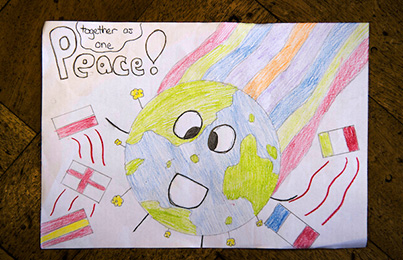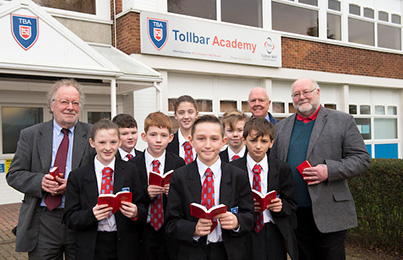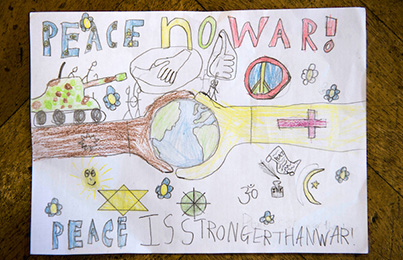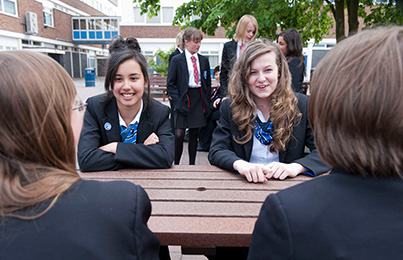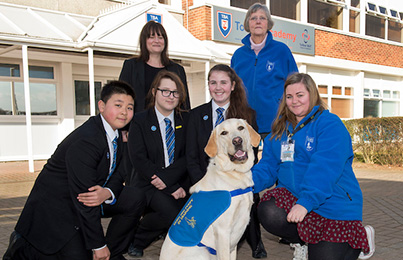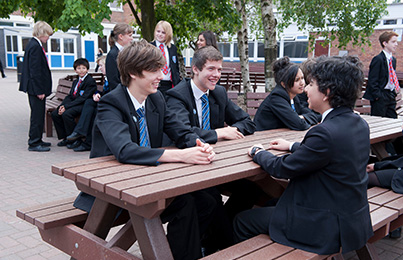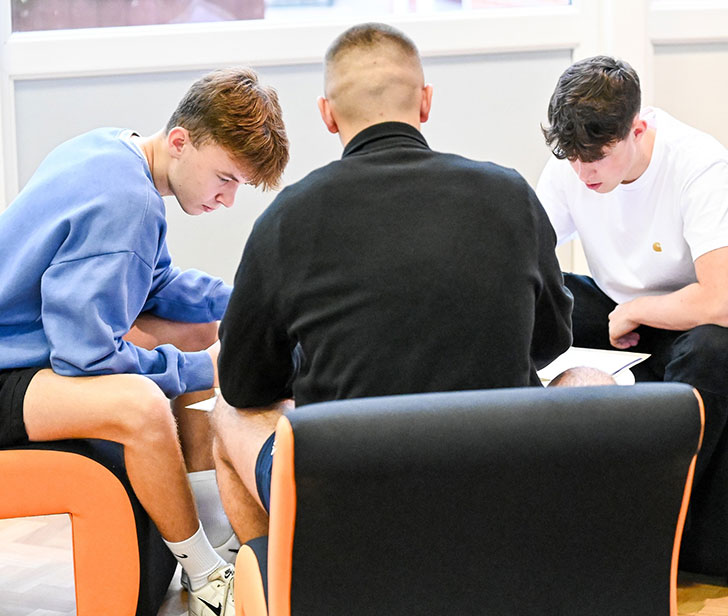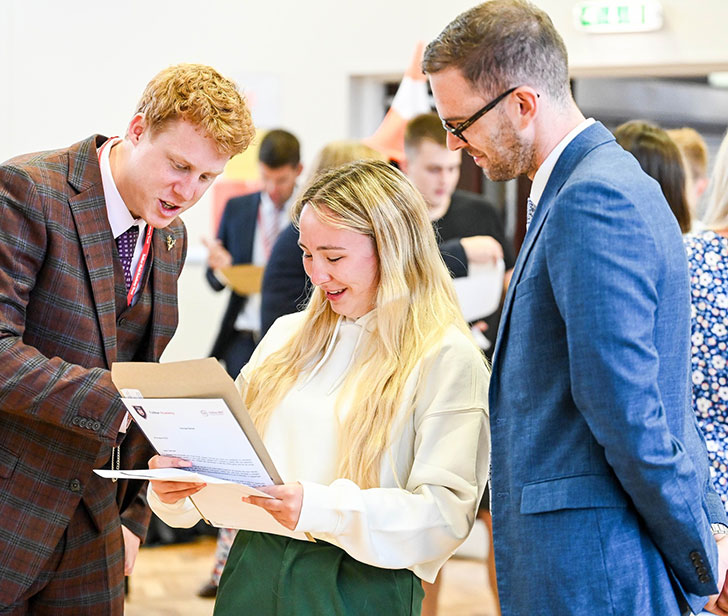Religious Education
Curriculum Intent, Implementation & Impact
- Religious Education
- Ethos & Values
- Knowledge & Skills
- Resources & Facilities
- Courses & Qualifications
- Learning Outside The Classroom
- Where Does This Take Me In The Future?
Religious Education
The R.E. Curriculum Area enables students to explore fascinating questions relating to ethical behaviour, morality, spirituality and belief. Students are given opportunities to investigate a wide range of religious teachings and secular worldviews and to address issues such as the existence of God, moral behaviour, importance of authority, issues surrounding conflict, the role of religion in Britain and the relationship between faith and science.
Lessons help students to develop many important life skills and to develop their understanding of the people and the world in which we live. Through the careful and sensitive consideration of different cultures, belief systems, traditions and moral issues, students learn to understand and respect the similarities and differences that exist within local and global communities. R.E. helps to develop successful and independent learners by posing life's greatest questions and giving all students the opportunity for self-reflection; to develop their own opinions and beliefs, to respond to contemporary moral and ethical issues, to challenge themselves and to ultimately understand more about themselves and others.
R.E. not only contributes to the spiritual and moral development of our students, but it is also a rigorous, academic subject, with consistently high expectations for student attainment.
Furthermore, as the teaching of R.E. is always unbiased, there is a place for all students, of whichever faith and none, in lessons.
Please explore these pages to find out more about what we offer.
Ethos & Values
We aim:
- To effectively deliver the R.E. curriculum in a way that allows all students to enjoy and achieve.
- To create an atmosphere of inclusivity in all lessons and ensure that the classroom becomes a genuine 'community of enquiry'.
- To enhance student’s understanding and appreciation of cultural capital and assist in preparing them for life outside of education as fully as possible.
- To have consistently high expectations and match these with high quality resources and learning strategies.
- To contribute to the spiritual, moral, social and cultural development of students through the provision of a range of educational experiences appropriate to their age, ability and needs.
- To adopt a philosophy of continuous improvement in all aspects of the delivery of the R.E. curriculum.
Knowledge & Skills
In their R.E. lessons students will develop their knowledge and understanding of human behaviour and its consequences for other human beings, as well as developing a greater awareness of the world in which we live.
Lessons will not only develop subject specific knowledge as students learn about religions and other beliefs systems, but also promote a wider range of skills and attributes, as reflect on their own beliefs and values. Students will also have the opportunity to explore their own approach to morality and consider a wide range of approaches to a series of complex moral and ethical issues.
Examples of how students may benefit from their R.E. lessons are listed below:
- They can understand what motivates people, what they think and how they feel.
- They are able to read, interpret and evaluate different kinds of information, including text, maps, diagrams and symbols.
- They are able to look carefully at different sources of information and draw conclusions regarding how reliable they are.
- They are able to communicate clearly and effectively both verbally and on paper, displaying good levels of Literacy.
- They develop their understanding and awareness of spiritual, moral, social and cultural issues.
- They are able to weigh up evidence in order to formulate their own opinions and debate with others who may have differing views.
- They are able to back up claims and personal beliefs effectively whilst considering the counter-arguments posed.
Resources & Facilities
We have a number of dedicated, professional and fully qualified staff in the R.E. Department, all of whom are passionate about teaching the subject and the contribution that it makes to the whole curriculum.
Lessons are taught in well-equipped and comfortable classrooms, equipped with interactive facilities or a projector and a wide range of quality resources, ranging from excellent detailed textbooks and religious artefacts, to subject specific software.
We also have access to ICT facilities which can be utilised by staff for lessons which require computer access.
Courses & Qualifications
Key Stage 3:
All students have one period of R.E. in Key Stage 3 in accordance with the Locally Agreed Syllabus and national requirements. Lessons cover a broad range of themes including the environment, animal rights, rights and responsibilities and conflict and peace. Students also have the opportunity of studying units based on the six major religions of the world (Christianity, Islam, Judaism, Buddhism, Hinduism and Sikhism) alongside other religious and non-religious worldviews.
Key Stage 4:
At Key Stage 4, students are able to complete a full course GCSE qualification in Religious Studies. There is no coursework element to the GCSE Religious Studies course, with assessment taking place via three written examinations at the end of the course.
As part of the GCSE Religious Studies course, students develop their knowledge and understanding of different faiths, non-religious viewpoints and a wide range of moral and ethical issues. They complete an in-depth study of two world faiths - Christianity and Hinduism, exploring the beliefs, teachings and practices of each. They also explore four separate themes; Relationships, Life and Death, Human Rights and Good and Evil.
The GCSE course is assessed by three written examinations:
Component 1: Religious, Philosophical and Ethical Studies in the Modern World
Written Examination: 2 hours
50% of qualification
Component 2: Study of Christianity
Written examination: 1 hour
25% of qualification
Component 3: Study of a World Faith - Hinduism
Written examination: 1 hour
25% of qualification
Through their studies in this curriculum area, students are able to:
- Adopt an enquiring, critical and reflective approach to the study of religion.
- Reflect on fundamental questions and respond to them personally.
- Enhance their spiritual and moral development.
- Enhance their personal, social and moral development and develop their understanding of different cultures locally, nationally and in the wider world.
- Develop their interest in and enthusiasm for the study of religion, and relate it to the wider world.
- Reflect on and develop their own values, opinions and attitudes in the light of their learning.
Key Stage 5
At Key Stage 5 students are able to complete an A Level in Philosophy, Ethics and Theology. There is no coursework element to this course, with assessments taking place via three written exams at the end of the course.
Whilst studying A Level Philosophy, Ethics and Theology students are given a thorough understanding of each of the major components of the course. In Philosophy, students will learn how philosophical thought has changed over time by depth studies of classical philosophers such as Plato, Enlightenment philosophers such as Descartes and contemporary philosophers such as Swinburne. In Ethics they will explore normative ethical theories such as Natural Law and Kantian Ethics and apply these to contemporary ethical dilemmas such as euthanasia. In Theology students consider the development of Christian thought by exploring the works of key religious thinkers such as Dietrich Bonhoeffer and current movements in Christianity such as Liberation Theology.
The A Level course is assessed by three written examinations:
Component 1: Philosophy
Written Examination: 2 hours
33% of qualification
Component 2: Ethics
Written Examination: 2 hours
33% of qualification
Component 3: Theology
Written Examination: 2 hours
33% of qualification
The study of Philosophy, Ethics and Theology develops a range of academic skills such as:
- Debating and discussion;
- Independent research;
- Referencing;
- Constructing arguments;
- Essay writing;
- Application of theories to real life situations.
Learning Outside The Classroom
The R.E. Department understands the rich contribution that learning outside of the classroom can make to a student's education. Students are engaged in entry to various competitions to involve students in this subject and all it has to offer. The Department also provides a range of revision and support classes for Key Stage 4 students. These are held at the end of the Academy day and during some holidays, aimed at helping all students fulfil their academic potential in the subject.
Where Does This Take Me In The Future?
The study of R.E. allows learners to develop a variety of valuable and transferable skills which pave the way to a wide variety of different careers paths or areas of further study. Some examples of careers that use skills developed in R.E. are:
Accountancy, Administration, Archaeology, Architecture, Broadcasting, Civil Service, Diplomatic Service, Drama, Theatre and the Performing Arts, Education, Environment and Conservation, Finance, Information Management, Media, Medicine, Teaching, Public Relations, Journalism, Law, Police, Politics, Publishing, Sales and Marketing, Tourism, Town Planning, TV Research, Social Work… to name just a few!
The qualifications gained in R.E. lessons are highly regarded by many employers and universities, as the wide range of skills and knowledge provided allows the student to develop as an individual. Most universities offer courses in Religious Studies, Philosophy and Theology for students who are interested in pursuing this subject at a higher level.
